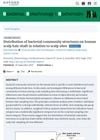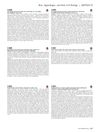 September 2023 in “Bioscience, biotechnology, and biochemistry”
September 2023 in “Bioscience, biotechnology, and biochemistry” Bacterial communities on scalp hair are unique to each person but consistent across different scalp sites.
 April 2018 in “Journal of Investigative Dermatology”
April 2018 in “Journal of Investigative Dermatology” Sensitive scalp has higher pH, more redness, abnormal sebum, and altered bacterial makeup.
 November 2017 in “British Journal of Dermatology”
November 2017 in “British Journal of Dermatology” Organ transplant recipients have a higher risk of skin cancer over time, atopic dermatitis skin shows unusual bacterial and fungal patterns, a new tool for measuring hidradenitis suppurativa severity was created, and gene expression changes in male baldness suggest new treatments.
 65 citations,
October 2018 in “Frontiers in cellular and infection microbiology”
65 citations,
October 2018 in “Frontiers in cellular and infection microbiology” Certain bacteria and fungi are linked to healthy scalps and dandruff, suggesting that the scalp's microbial balance affects its health.
December 2022 in “Frontiers in Microbiology” The scalp microbiome is more diverse and may be more important in hair loss than the gut microbiome.
 1 citations,
July 2022 in “PLOS ONE”
1 citations,
July 2022 in “PLOS ONE” The study concluded that people with Lichen Planopilaris have a more diverse scalp bacteria and different metabolic pathways compared to healthy individuals.
 6 citations,
December 2023 in “Lancet. Infectious diseases/The Lancet. Infectious diseases”
6 citations,
December 2023 in “Lancet. Infectious diseases/The Lancet. Infectious diseases” SIM01 significantly reduced post-COVID symptoms and is safe.

Thermal spring waters and their microbes could be good for skin health and treating some skin conditions in skincare products.
 16 citations,
January 2021 in “Dermatology and therapy”
16 citations,
January 2021 in “Dermatology and therapy” An imbalance in gut bacteria is linked to skin immune diseases and may affect their outcomes and related health issues.
 October 2020 in “Veterinary Dermatology”
October 2020 in “Veterinary Dermatology” New treatments and diagnostic methods for various animal skin conditions showed promising results.
 1 citations,
January 2023 in “Metabolites”
1 citations,
January 2023 in “Metabolites” Changes in gut bacteria can contribute to the development of Polycystic Ovary Syndrome (PCOS), affecting metabolism, immunity, and causing inflammation. Treatments may involve adjusting these factors.
1 citations,
November 2022 in “Nutrients” Hair glucocorticoid levels and gut bacteria are linked to growth rates in piglets.
 82 citations,
August 2017 in “Cell Reports”
82 citations,
August 2017 in “Cell Reports” An imbalanced gut and lack of biotin can cause hair loss in mice.
 26 citations,
May 2019 in “PLOS ONE”
26 citations,
May 2019 in “PLOS ONE” Hair loss patients have different microbes in hair follicles, possibly affecting hair loss.
 September 2023 in “Clinical, cosmetic and investigational dermatology”
September 2023 in “Clinical, cosmetic and investigational dermatology” SLFC can improve scalp health and reduce sensitive scalp symptoms.
 December 2017 in “Journal of Cosmetic Dermatology”
December 2017 in “Journal of Cosmetic Dermatology” Researchers found certain genes are overactive and others are underactive in men with early balding, which could help create new treatments.
 14 citations,
January 2020 in “International Journal of Biological Sciences”
14 citations,
January 2020 in “International Journal of Biological Sciences” Ranitidine and finasteride lower TMAO levels, reducing heart and kidney damage by changing gut bacteria.
 8 citations,
October 2022 in “Cold Spring Harbor perspectives in biology”
8 citations,
October 2022 in “Cold Spring Harbor perspectives in biology” The document concludes that better understanding the wound microbiome can improve chronic wound care by preserving helpful bacteria and targeting harmful ones.
 3 citations,
August 2021 in “Cutis”
3 citations,
August 2021 in “Cutis” Some alternative medicine treatments might work for skin conditions, but their effectiveness and safety differ a lot.
 January 2024 in “Burns and trauma”
January 2024 in “Burns and trauma” The skin microbiome helps heal wounds and can be targeted to improve healing.
 September 2023 in “Mağallaẗ baġdād li-l-ʿulūm”
September 2023 in “Mağallaẗ baġdād li-l-ʿulūm” Microbial communities in Duku plant roots vary between wet and dry habitats, affecting plant health.
 March 2021 in “bioRxiv (Cold Spring Harbor Laboratory)”
March 2021 in “bioRxiv (Cold Spring Harbor Laboratory)” A specific immune response helps control mite populations on the skin, maintaining healthy hair follicles.
 April 2018 in “Journal of Investigative Dermatology”
April 2018 in “Journal of Investigative Dermatology” The keratin network in mouse skin changes during cornification and affects the skin's protective barrier.
 April 2018 in “Journal of Investigative Dermatology”
April 2018 in “Journal of Investigative Dermatology” STIM1 is essential for sweat secretion.
 April 2018 in “Journal of Investigative Dermatology”
April 2018 in “Journal of Investigative Dermatology” Researchers found a substance in chicken egg yolk that helps hair grow.
 April 2018 in “Journal of Investigative Dermatology”
April 2018 in “Journal of Investigative Dermatology” Light can activate hair growth through a pathway from the eyes to hair follicles.
 April 2018 in “Journal of Investigative Dermatology”
April 2018 in “Journal of Investigative Dermatology” People with alopecia areata have higher levels of a heart disease marker in their blood.
 December 2021 in “Revista da Sociedade Portuguesa de Dermatologia e Venereologia”
December 2021 in “Revista da Sociedade Portuguesa de Dermatologia e Venereologia” Imbalance in scalp bacteria can affect hair and scalp health, potentially leading to conditions like hair loss, psoriasis, and dandruff.
 73 citations,
April 2019 in “Experimental Dermatology”
73 citations,
April 2019 in “Experimental Dermatology” The scalp's microorganisms significantly affect hair health and disease.
24 citations,
August 2022 in “Immunity” Type 2 immunity helps control mite growth in hair follicles, preventing damage.



























